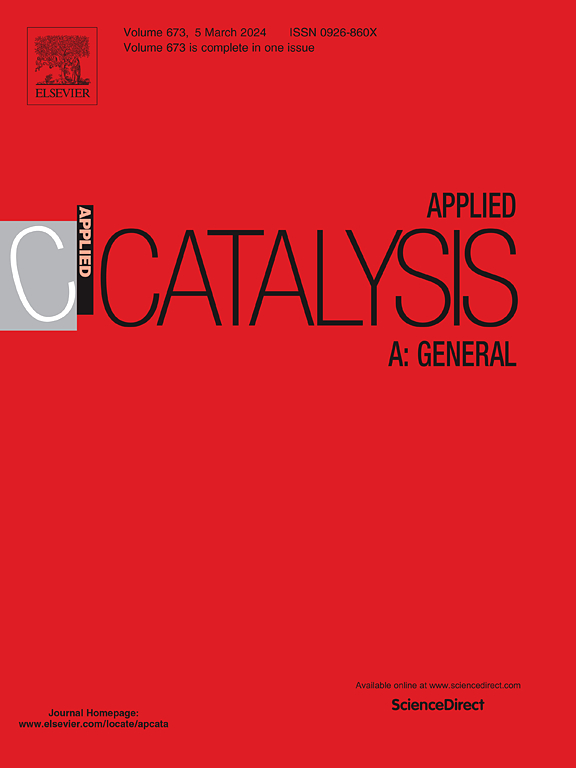Solid raney-type Ni foam catalysts for xylitol production: Continuous and batch operation
IF 4.7
2区 化学
Q2 CHEMISTRY, PHYSICAL
引用次数: 0
Abstract
Solid activated metal foam catalysts represent a promising alternative for the continuous production of valuable sugar alcohols. Traditionally, sugar alcohols are produced industrially in batch mode using finely dispersed Raney-type nickel catalysts. In this study, novel solid foam Raney-type Ni catalysts (activated metal foam catalysts) were used for the hydrogenation of xylose to xylitol in both batch and continuous operation. Two types of catalysts were investigated: Raney-type Ni foam (Metalyst® MC 911 by Evonik Operations GmbH, Ev-F-Ni) and Raney-type Ni foam promoted with molybdenum (Metalyst® MC 981 by Evonik Operations GmbH, Ev-F-NiMo). Catalyst deactivation was primarily attributed to the accumulation of strongly adsorbed organic species on the active sites and to Ni and Al leaching, which reduced the availability of catalytically active sites. Ev-F-NiMo demonstrated a superior stability and activity compared to Ev-F-Ni, attributed to electronic interactions between Mo and Ni, which stabilize Ni in a lower oxidation state and reduce metal leaching under reaction conditions. In continuous operation, the catalysts exhibited reduced deactivation, likely due to enhanced desorption of poisons under the continuous flow of fresh feed. Although the exposure to xylonic acid, a potential poison forming on the catalyst surface, temporarily reduced the xylitol yield in continuous mode, the Ev-F-NiMo catalyst demonstrated good resilience, recovering its activity after the removal of the poisoning species. These results highlight the very attractive technical solution for the continuous production of sugar alcohols from sugar monomers, utilizing promoted Raney-type Ni catalyst that is highly active, selective and cost-effective.
木糖醇生产用固体镍泡沫催化剂:连续和间歇操作
固体活化金属泡沫催化剂是连续生产有价糖醇的一种很有前途的替代方法。传统上,糖醇的工业生产是在间歇式模式下使用精细分散的兰尼型镍催化剂。本研究采用新型固体泡沫raney型Ni催化剂(活性金属泡沫催化剂)进行木糖加氢制木糖醇的间歇加氢和连续加氢。研究了两种催化剂:raney型Ni泡沫(Evonik Operations GmbH的Metalyst®MC 911, Ev-F-Ni)和钼促进的raney型Ni泡沫(Evonik Operations GmbH的Metalyst®MC 981, Ev-F-NiMo)。催化剂失活主要归因于活性位点上强吸附的有机物质的积累以及Ni和Al的浸出,这降低了催化活性位点的可用性。与Ev-F-Ni相比,Ev-F-NiMo表现出更好的稳定性和活性,这是由于Mo和Ni之间的电子相互作用,使Ni稳定在较低的氧化状态,并减少了反应条件下的金属浸出。在连续操作中,催化剂表现出较低的失活程度,可能是由于在新鲜饲料连续流动下毒物的解吸增强。在连续模式下,虽然暴露于木糖酸(一种潜在的毒素在催化剂表面形成)会暂时降低木糖醇的产率,但Ev-F-NiMo催化剂表现出良好的弹性,在去除有毒物质后恢复其活性。这些结果突出了利用高活性、选择性和成本效益高的促进raney型Ni催化剂从糖单体连续生产糖醇的非常有吸引力的技术解决方案。
本文章由计算机程序翻译,如有差异,请以英文原文为准。
求助全文
约1分钟内获得全文
求助全文
来源期刊

Applied Catalysis A: General
化学-环境科学
CiteScore
9.00
自引率
5.50%
发文量
415
审稿时长
24 days
期刊介绍:
Applied Catalysis A: General publishes original papers on all aspects of catalysis of basic and practical interest to chemical scientists in both industrial and academic fields, with an emphasis onnew understanding of catalysts and catalytic reactions, new catalytic materials, new techniques, and new processes, especially those that have potential practical implications.
Papers that report results of a thorough study or optimization of systems or processes that are well understood, widely studied, or minor variations of known ones are discouraged. Authors should include statements in a separate section "Justification for Publication" of how the manuscript fits the scope of the journal in the cover letter to the editors. Submissions without such justification will be rejected without review.
 求助内容:
求助内容: 应助结果提醒方式:
应助结果提醒方式:


